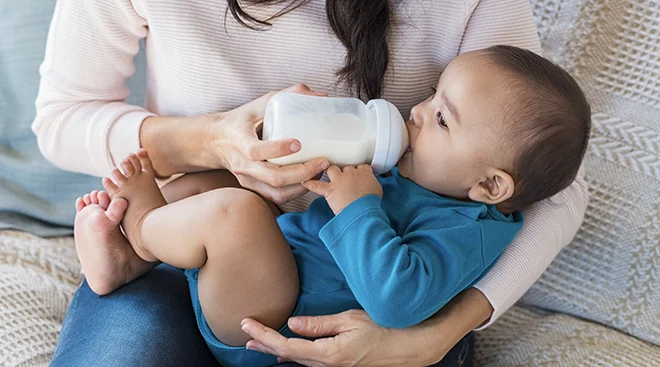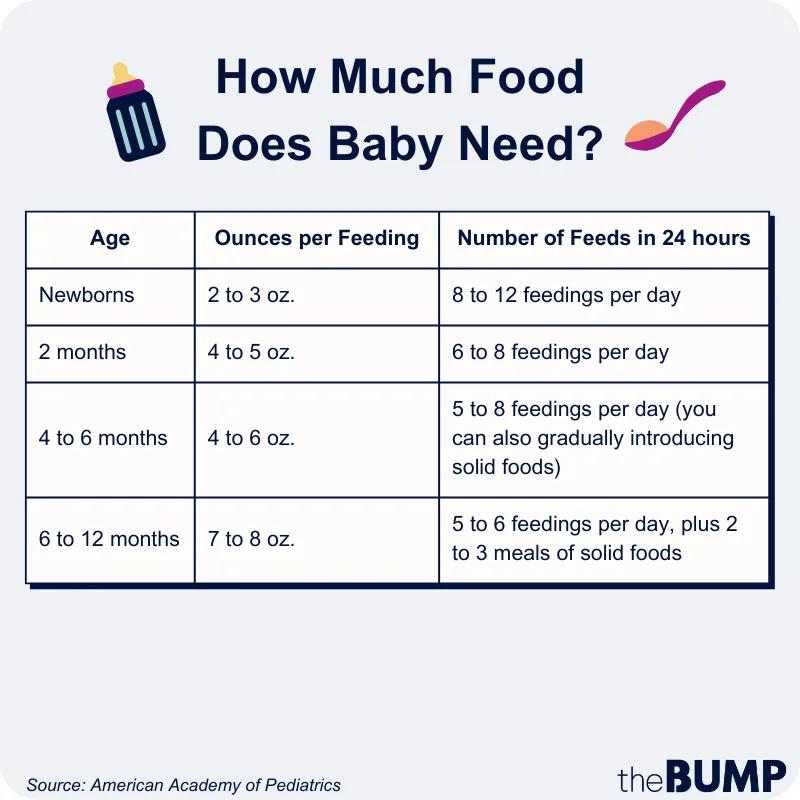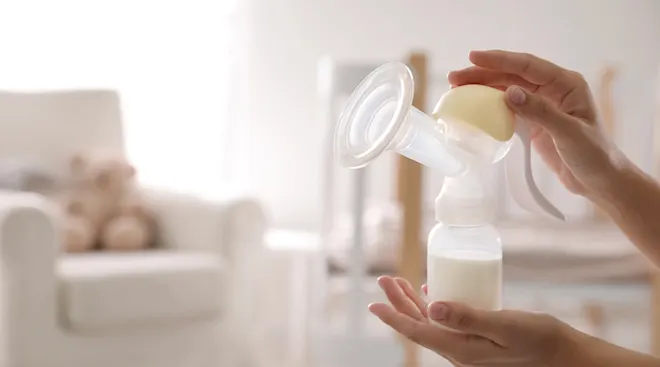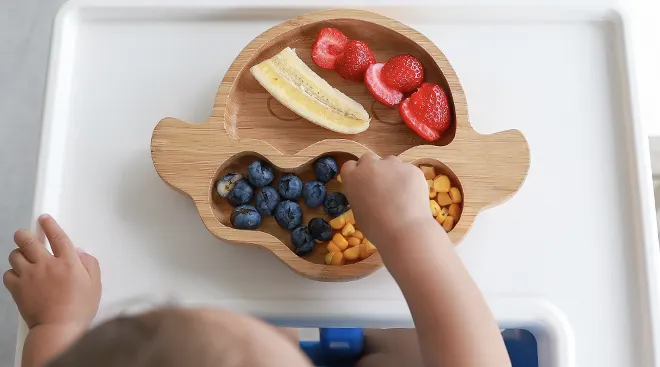How to Tell if You’re Overfeeding a Baby
It’s a question you may or may not have thought of: Can you overfeed a newborn? We spend so much time fussing over whether baby is getting enough formula or breast milk—and for new parents it can be hard to tell what’s actually enough. Many parents may try to coax baby to finish their bottle or worry that baby isn’t getting enough at the breast—when, really, baby has just had their fill. So can you overfeed a breastfed baby? What about a formula or bottle-fed baby? And can all that well-intentioned worrying lead you to inadvertently overfeed your little one? Plus, how can you know when a newborn is full? Read on for all the answers.
You can breathe a sigh of relief: Most of the anxiety over a newborn’s food intake isn’t warranted. Unlike adults, newborns have an incredibly sophisticated self-regulation system: When they’re hungry, they eat, and when they’re full, they stop. So when babies turn away from the bottle or breast and refuse to even consider another nip, they’re telling you they’re full. When baby keeps coming back for more, that’s a sign they’re truly hungry (even if they just finished a full bottle!). Keep in mind, newborns undergo a number of growth spurt, so it’s best to feed them on demand.
“If baby’s gaining weight and growing and your pediatrician isn’t concerned, you don’t need to worry,” says Alanna Levine, MD, a pediatrician at Orangetown Pediatric Associates in Orangeburg, New York. Different babies grow at different rates and eat different amounts at different times.
That said, it is possible to overfeed a newborn or older baby under certain circumstances. We dive into that, below!
Wondering if you can over-breastfeed a newborn or older baby? According to experts, it’s pretty hard to do—they’ll naturally turn away when they’re done—but it’s not impossible. Newborns and babies have incredibly small stomachs that can be easy to overfill, notes Denise Scott, MD, an Oklahoma-based pediatrician and author of Feed Your Child’s Future Health: Prevent Disease Before It Starts.
But what causes overfeeding in breastfed babies? Scott and the American Academy of Pediatrics (AAP) note it usually happens if Mom has an oversupply of milk, if her milk flow is too fast or if baby’s repeatedly encouraged to latch even after they’ve turned away. (For example, perhaps they’ve gotten enough from a single breast while nursing, but you get them to latch on to the second breast afterward.)
Can you overfeed a bottle-fed baby breast milk or formula? Again, it’s possible—in fact, overfeeding is more common in bottle-fed babies. One of the biggest causes is parents giving baby the bottle again even after they’ve turned away. This is why pediatricians Dina DiMaggio, MD, and Anthony F. Porto, MD, MPH, authors of The Pediatrician’s Guide to Feeding Babies and Toddlers, echo the importance of following your child’s cues—regardless of whether they’re breastfed or formula-fed. “We’re often asked, ‘how come my child didn’t finish their bottle of formula?,’ but we’re rarely asked that when children are breastfed.” (Probably because it’s a lot easier to see—and worry about—how much milk is left in a bottle.)
While how much each newborn eats will vary (more on this below), it’s important to remember it’s perfectly normal for baby not to finish their bottle, as long as they’re hydrated and eating enough throughout the day. “Infants have a better understanding of when they’re full and, unlike most adults, don’t just eat whatever serving size is put in front of them,” DiMaggio says.
Another big reason bottle-fed babies may overfeed more easily? It takes less effort to drink from a bottle, adds Jennifer L.W. Wink, RN, a registered nurse and educator. For this reason, babies who love to suck for comfort may inadvertently get too much milk while feeding.
Additionally, if the bottle’s nipple flow is too fast, baby may end up getting more than they need.
How can you know if baby is overfed? The good news is, since you’ll likely be visiting a pediatrician often for each of baby’s checkups, you can collectively track baby’s weight gain and feeding patterns. But don’t just rely on weight as an indicator of whether you’re overfeeding baby. The experts note some other signs of overfeeding a breastfed or bottle-fed baby include:
- Fussiness
- Discomfort
- Gassiness
- A tight belly following feedings
- Spitting up
- Vomiting
Keep in mind that some spit up and “wet burps” are normal, but if baby’s spitting up most of their meal or vomiting, it could be a sign of overfeeding. “The easiest way for that milk to get out of the stomach is to come right back up,” Scott explains. If baby shows symptoms of vomiting or is eating too much for their age, your pediatrician might recommend limiting how many ounces baby is drinking or how many times they feed, Porto says.
If you think you’ve been overfeeding baby, there are a few ways to curb the habit. First and foremost, make a point of respecting your child’s feeding cues. “If baby turns away before the bottle is finished or before your usual nursing time is up, accept the fact that they may not be hungry now,” Levine says. As hard as it can be, don’t focus on the numbers. It doesn’t matter how many ounces baby finishes at each feeding—what matters is that baby is healthy and happy overall.
If you’ve been overfeeding your breastfed infant due to an oversupply of milk, consider pumping and storing breast milk for future feedings, Scott says. This may also help if the flow of the breast milk is too fast for baby, leading them to swallow some air while feeding. Of course, if the nipple flow is too fast for a bottle-fed baby, consider switching to a different one. Lastly, if baby’s continuing to suck for comfort, pay close attention to their hunger cues and consider giving them a pacifier instead once you think they’re no longer hungry.
Frequently Asked Questions
How much should a newborn eat?
Pediatricians usually base how much newborns should eat on their weight. Per the AAP, newborns usually work their way up from 2 to 3 ounces per feeding to 4 to 5 ounces per feeding. On average, a full-term newborn drinks 2 ounces of formula per bottle every three to four hours, or breastfeeds on demand (about 8 to 12 times a day), according to DiMaggio. At one month old, baby will likely drink 3 to 4 ounces of formula per bottle every three to four hours, while a breastfeeding baby may feed approximately eight to ten times a day. This pattern of baby drinking more ounces of formula or breastfeeding fewer times a day lasts until they’re 8 to 12 months old, at which point baby may drink 7 to 8 ounces of formula per bottle or breastfeed three to four times a day. “As the weight and age increase, the volume will increase, and the number of feedings gradually decrease,” Scott explains.
Do newborns continue eating even when they’re full?
Can a newborn overfeed on their own? As mentioned, babies typically have a good system of self-regulation and will turn away once they’re full. That said, it’s possible for newborns and babies to continue wanting to suck to soothe themselves, even when they’re full. “If they stay on the breast or bottle too long, they may continue feeding,” she explains. “Sucking gives comfort, so if full and uncomfortable, they may continue to feed [anyway].”
How can I make sure baby’s getting enough to eat?
There are several ways to assess whether baby’s getting enough to eat, Scott says. This includes paying attention to the time intervals between feedings, how many times a day baby feeds and how many wet and dirty diapers they produce. But Scott cites weight gain as the best indicator of whether baby’s getting enough to eat. (Your pediatrician will check this at each of baby’s well visits.) Additionally, pay attention to baby’s hunger cues, such as rooting, smacking their lips, bringing their hands to their mouth and becoming more alert.
It can be hard to figure out if baby’s getting too much or too little milk in those first few weeks and months. If you’re ever concerned about possibly overfeeding baby (or baby not getting enough to eat), talk to your pediatrician. They’ll look at baby’s length, weight and overall development. But odds are that as long as baby’s gaining enough weight and is otherwise healthy and thriving, they’re probably eating and growing just fine.
Please note: The Bump and the materials and information it contains are not intended to, and do not constitute, medical or other health advice or diagnosis and should not be used as such. You should always consult with a qualified physician or health professional about your specific circumstances.
Plus, more from The Bump:
Dina DiMaggio, MD, is a board-certified pediatrician, a spokesperson for the AAP and co-author of The Pediatrician’s Guide to Feeding Babies and Toddlers: Practical Answers to Your Questions on Nutrition, Starting Solids, Allergies, Picky Eating and More. She is also a clinical assistant professor in the department of pediatrics at NYU Grossman School of Medicine. She earned her medical degree from the Albert Einstein College of Medicine, and was previously a resident at Montefiore Medical Center in New York City.
Alanna Levine, MD, is a pediatrician at Orangetown Pediatric Associates in Orangeburg, New York, and works on staff at Englewood Hospital and Medical Center in New Jersey. In addition, she serves as a spokesperson for the American Academy ofPediatrics. She earned her medical degree from Sackler School of Medicine in Tel Aviv, Israel, a master’s degree in medical sciences from Boston University and completed her residency at the Mount Sinai Hospital.
Anthony F. Porto, MD, MPH, is the co-author of The Pediatrician’s Guide to Feeding Babies and Toddlers: Practical Answers to Your Questions on Nutrition, Starting Solids, Allergies, Picky Eating and More, as well as a spokesperson for the American Academy of Pediatrics. He’s also a pediatric gastroenterologist at Yale New Haven Health and medical director of the Yale Pediatric Celiac Program in New Haven, Connecticut. He earned his medical degree and master’s in public health at Tufts University School of Medicine and completed his residency at the Children’s Hospital at Montefiore Medical Center.
Denise Scott, MD, is a pediatrician and a pediatric endocrinologist based in Oklahoma with over 30 years of experience. Certified in culinary medicine, Scott also runs the blog Feed Future Health and is the author of Feed Your Child's Future Health: Prevent Disease Before it Starts. She received her medical degree from the University of Texas Medical Branch and completed her residency at the University of Oklahoma Health Sciences Center with a fellowship at the National Institutes of Health.
Jennifer L.W. Wink, RN, is a registered nurse, writer and educator. She earned her bachelor’s degree in nursing from the University of North Carolina- Wilmington. Presently, she’s also a member of the American Society of Journalists and Authors.
American Academy of Pediatrics, How Often and How Much Should Your Baby Eat?, April 2024
Learn how we ensure the accuracy of our content through our editorial and medical review process.
Navigate forward to interact with the calendar and select a date. Press the question mark key to get the keyboard shortcuts for changing dates.






















































